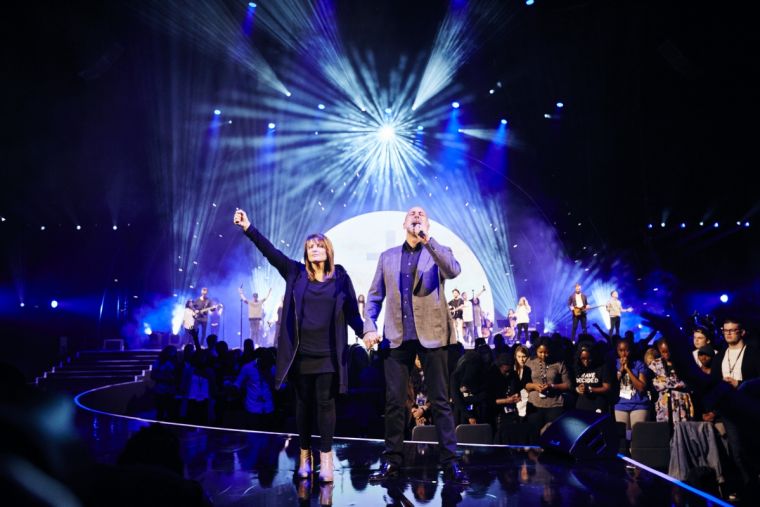'Now is the time': Vineyard Worship on diversity, discipleship and redefining success
'The Vineyard has always done worship. But we can't just sit back and do what we've always done.'
So says Harmony Smith, director of Worship for Vineyard Records – recently rebranded as Vineyard Worship UK and Ireland, a subtle shift with specific purpose. The famous record label, which released its influential debut album Come, Now is the Time 20 years ago, is better understood as a 'church-planting movement', Harmony tells Christian Today.
It's a 'movement of worshipping communities whose highest priority is the presence of God,' she says, and 'Vineyard Worship captures that better than Vineyard Records'. The first release under the new label was artist Samuel Lane's album The Difference, released earlier this month. But the change in name isn't the only shift Harmony would like to see.
With Church music production now a global industry worth millions, the role of 'worship leader' can be seen as an elitist one, preserved for a select few. But Harmony is adamant that Vineyard promotes a 'broad banner for diverse giftings and callings to get involved...whoever you are'. Subsequently its priority is intimate and dedicated training to enliven church worship and empower its diversity across the UK and Ireland.
This comes as part of a larger desire not to rest on laurels and let things be as they are. The Vineyard movement, and the worship that has spun out from it across the world has been highly succesful, but Smith says that its leadership is not complacent. Spearheaded by national directors John and Debby Wright, it is focused on the future, an 'ongoing stewarding...pressing into worship from top-down', Smith says.

'We can't just sit back and do what we've always done...we need to invest.'
Debby Wright said of Vineyard's new 'season' of worship: 'We are emerging like a butterfly into something that lies at the heart of Vineyard, we are back to our roots: worshipping him. Twenty years ago God blessed us in a wonderful way, we blessed the world and gave away what started in our hearts. This year we are going back to those fundamentals. It's all about worship.'
The fruit of that commitment includes worship leader 'intensives', dedicated gatherings of individuals, be they youth worship leaders, lay leaders or otherwise, to equip and encourage them in both Vineyard's core values but also in helping them find their own local voice.
But the way many churches worship now, and share their music, has shifted dramatically in recent decades. Though popular, modern praise culture is not without its critics. Asked what the biggest challenge facing worship leaders today is, Smith says: 'One of the big questions for worship leaders in 2018 is, "What does success look like?"'
It may be name recognition, an album deal, a record label, a role at a small or big church, Smith says. It might be measured by album sales, or perhaps the reaction of live audiences in church or on tour.
But rather than a focus on worldly 'success', Smith wants to ask: 'What does fruitfulness look like...I think we're a bit confused. And how do we measure that?
'One of the reasons we're investing in coaching and training – ultimately that is discipleship – we have the opportunity to mother and father a generation who are trying to figure out who they are and what they're for.'
With the next generation of leaders, in the face of competition, Smith says she wants to 'redefine success...not for them but with them'. She hopes the intentionally smaller scale of Vineyard's 'intensives' will serve that kind of deep relationship and growth.
Another key value of Vineyard Worship moving forward is a focus on locally produced worship: diverse sounds from diverse communities. In Smith's words: 'Our mission is to train worship leaders, equip the church and to capture the songs that emerge from within our movement.'
Is this a push-back against the success of certain successful megachurch brands, such as Hillsong and Bethel, to whom many evangelical churches arguably now 'outsource' their worship?

Smith has no desire to be negative or critical, but says that a 'homogenous worship culture is not interesting to me...I don't think we're meant to sound the same'.
She values the 'accessibility' of global hits, insofar as they can help visitors connect with the familiar, 'but I don't think we should stop writing for local communities...it's both/and'.
So she has no ill-will to megachurch anthems, but 'when it comes at the expense of 50 local people having the confidence to sing out their own song...maybe it's the right song for their community, maybe the Holy Spirit is going to breathe on their voice of their people.' In April Vineyard Worship will release an album chronicling and celebrating music sourced locally from churches in the UK and Ireland.
Harmony calls it an 'exciting time' and cites a 'sense of new beginning'. The emphasis on decentralised diversity, and fruitfulness over 'success' means that while the Vineyard is growing: 'getting bigger for us looks like lots of smaller things.'
Reflecting on the changing world of the worship industry, she offers a simple caution for churches and their leaders today: 'We would do really well to sing about Jesus. Ultimately worship is not about us, it's not for us. We benefit...we experience him but it's for him.
'If there's any trend in lyrics that's concerning to me it's: "Are we singing about and to Jesus?"'
And that's a hopeful emphasis because its fruit, for the Vineyard, is 'intimacy with Jesus... knowing [God] and being known'.
In worship we're frequently 'singing our prayers', Harmony says, but: 'are our prayers just about us?'
For more information about Vineyard Worship, its music releases and upcoming event details visit its website.
You can follow @JosephHartropp on Twitter











